 They don't make virgins like they used to. 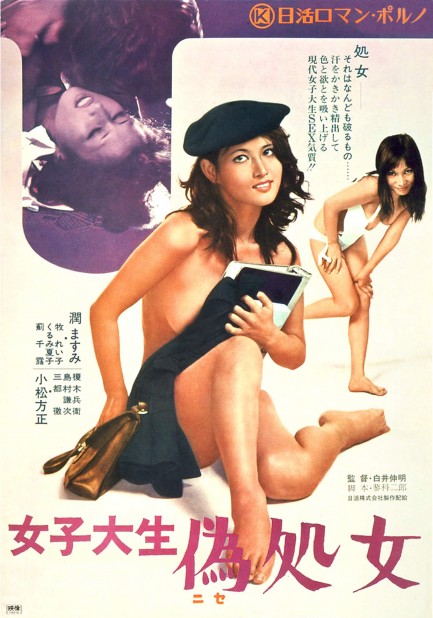
When Nikkatsu Studios attempted comedy, it may have been uproarious for audiences of the 1970s, but to us it's usually about on the same level as a Pauly Shore movie. But Joshidaisei: Nise shojo, known in English as College Girls: Fake Virgins, is, we have to admit, actually a bit amusing in parts. Or maybe it was just our mood at the time. We aren't going to watch it again to test the theory. When it comes to Nikkatsu, because its films are capable of being so shocking, when you get something pleasant you take your profits and don't look back.
Basically, what you get here is Kenji Simamura as a habitual molester who runs a real estate company. He meets Masumi Jun, Reiko Maki, and Natsuko Kurumi when he feels up Maki on a train, and is stunned when she snaps a pair of cuffs on his roaming hands. She isn't a cop. She just has them around because gropers are apparently a problem on Japanese trains of that time. From this auspicious encounter Sinamura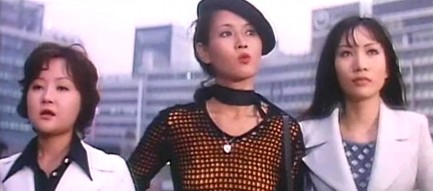 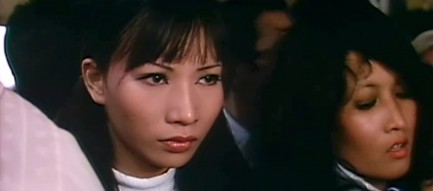 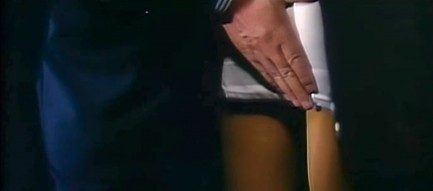 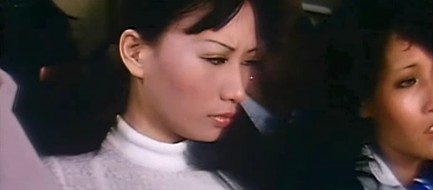 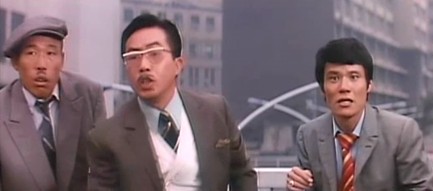 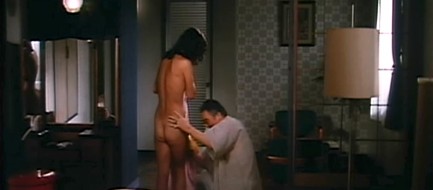 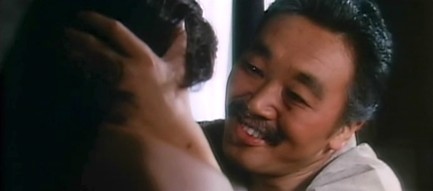 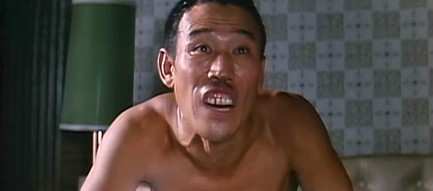 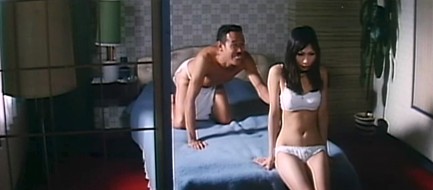 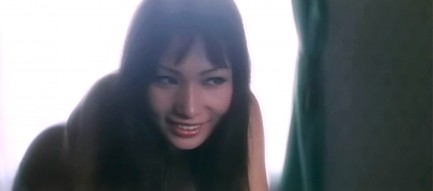 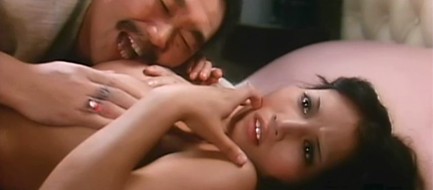 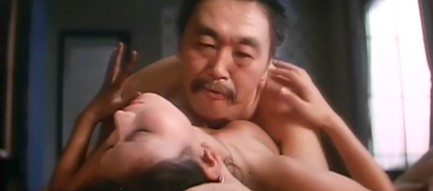 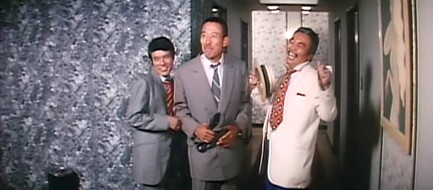 ends up hiring the girls to pose as virgins for three unsuspecting squares who own vast tracts of land he covets. Virginity is—at least as posited by the movie—what all men want. The three land-rich marks are, of course, unattractive klutzes, and not very bright besides, but for all that, it's obvious Simamura's grand scheme won't come off as planned. ends up hiring the girls to pose as virgins for three unsuspecting squares who own vast tracts of land he covets. Virginity is—at least as posited by the movie—what all men want. The three land-rich marks are, of course, unattractive klutzes, and not very bright besides, but for all that, it's obvious Simamura's grand scheme won't come off as planned.
The humor in this film is on a pretty basic level, but as we said, there are a few good moments. How can you not be amused when, after that groping on the train, the girls make Simamura buy them lunch—while still handcuffed to Maki? But most of the comedy is lame. Luckily, the movie has its beautiful leads to compensate. Since Jun and Maki star on the poster, we're having them star in the promo images below. Joshidaisei: Nise shojo premiered in Japan today in 1973.
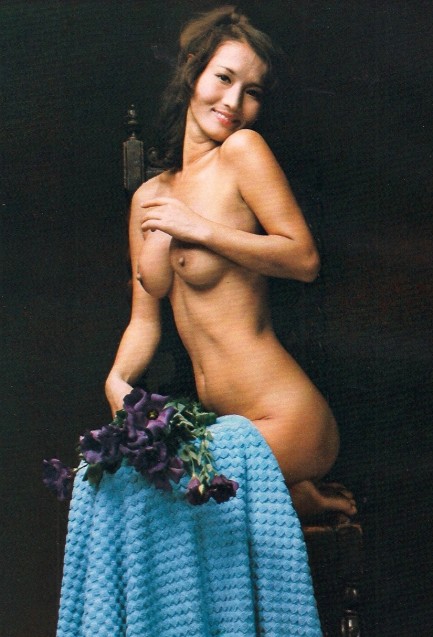 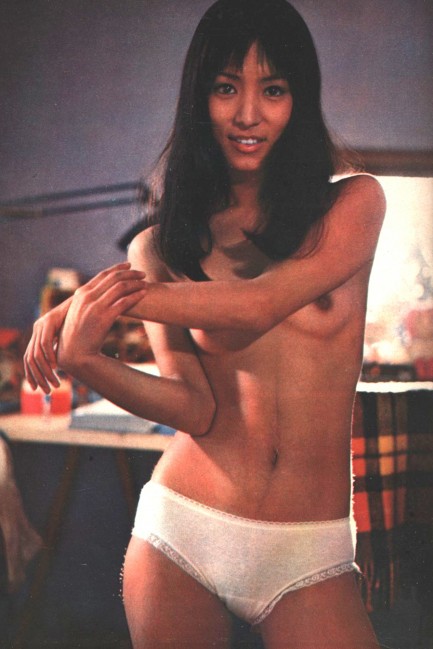
|
 |

The headlines that mattered yesteryear.
1945—Mussolini Is Arrested
Italian dictator Benito Mussolini, his mistress Clara Petacci, and fifteen supporters are arrested by Italian partisans in Dongo, Italy while attempting to escape the region in the wake of the collapse of Mussolini's fascist government. The next day, Mussolini and his mistress are both executed, along with most of the members of their group. Their bodies are then trucked to Milan where they are hung upside down on meathooks from the roof of a gas station, then spat upon and stoned until they are unrecognizable. 1933—The Gestapo Is Formed
The Geheime Staatspolizei, aka Gestapo, the official secret police force of Nazi Germany, is established. It begins under the administration of SS leader Heinrich Himmler in his position as Chief of German Police, but by 1939 is administered by the Reichssicherheitshauptamt, or Reich Main Security Office, and is a feared entity in every corner of Germany and beyond. 1937—Guernica Is Bombed
In Spain during the Spanish Civil War, the Basque town of Guernica is bombed by the German Luftwaffe, resulting in widespread destruction and casualties. The Basque government reports 1,654 people killed, while later research suggests far fewer deaths, but regardless, Guernica is viewed as an example of terror bombing and other countries learn that Nazi Germany is committed to that tactic. The bombing also becomes inspiration for Pablo Picasso, resulting in a protest painting that is not only his most famous work, but one the most important pieces of art ever produced. 1939—Batman Debuts
In Detective Comics #27, DC Comics publishes its second major superhero, Batman, who becomes one of the most popular comic book characters of all time, and then a popular camp television series starring Adam West, and lastly a multi-million dollar movie franchise starring Michael Keaton, then George Clooney, and finally Christian Bale. 1953—Crick and Watson Publish DNA Results
British scientists James D Watson and Francis Crick publish an article detailing their discovery of the existence and structure of deoxyribonucleic acid, or DNA, in Nature magazine. Their findings answer one of the oldest and most fundamental questions of biology, that of how living things reproduce themselves.
|

|
|

It's easy. We have an uploader that makes it a snap. Use it to submit your art, text, header, and subhead. Your post can be funny, serious, or anything in between, as long as it's vintage pulp. You'll get a byline and experience the fleeting pride of free authorship. We'll edit your post for typos, but the rest is up to you. Click here to give us your best shot.

|
|














 ends up hiring the girls to pose as virgins for three unsuspecting squares who own vast tracts of land he covets. Virginity is—at least as posited by the movie—what all men want. The three land-rich marks are, of course, unattractive klutzes, and not very bright besides, but for all that, it's obvious Simamura's grand scheme won't come off as planned.
ends up hiring the girls to pose as virgins for three unsuspecting squares who own vast tracts of land he covets. Virginity is—at least as posited by the movie—what all men want. The three land-rich marks are, of course, unattractive klutzes, and not very bright besides, but for all that, it's obvious Simamura's grand scheme won't come off as planned.











 ends up hiring the girls to pose as virgins for three unsuspecting squares who own vast tracts of land he covets. Virginity is—at least as posited by the movie—what all men want. The three land-rich marks are, of course, unattractive klutzes, and not very bright besides, but for all that, it's obvious Simamura's grand scheme won't come off as planned.
ends up hiring the girls to pose as virgins for three unsuspecting squares who own vast tracts of land he covets. Virginity is—at least as posited by the movie—what all men want. The three land-rich marks are, of course, unattractive klutzes, and not very bright besides, but for all that, it's obvious Simamura's grand scheme won't come off as planned.







































































